Psychological Thriller or Psychological Western?

“As the earth moves toward the sun, Travis Bickle moves toward violence.” ~ Paul Schrader
This post contains adult language that may be offensive. I have kept the gore out of it except for one small photo at the end.
Taxi Driver has held tight to its reputation of being one of the best films ever made for over 44 years; it has been lionized as iconic not just by avid movie-goers and critics, but also by the most famous directors in the world.
Replete with existential angst, the neo-noir explores very dark themes relating to loneliness and the ticking-time-bomb-effect that isolation can have on a young man’s mind – a mind that, left unchecked, begins to blend fantasy and reality with disastrous results.
Travis Bickle – the ultimate antihero – spirals from obsession to psychosis, and then to fanatical violence, which is ironically mistaken as heroism.
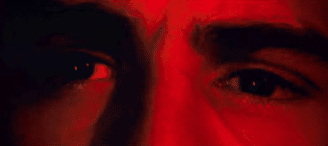
I wrote taxi driver… in 10 days. It sprang from my head like an animal… ~ Paul Schrader
An animal: What a fitting image for the raw 1976 film that was a low-budget, independent passion-project directed by Martin Scorsese, written by Paul Schrader, and starring Robert De Niro, Jodie Foster, Cybill Shepherd, Harvey Keitel, Peter Boyle, Leonard Harris and Albert Brooks
The film’s backdrop is a savage New York City on the brink of bankruptcy, with over a million citizens on welfare and over 800,000 middle class fleeing from urban decay to the suburbs in search of jobs.
Angry at cuts to social services, the remaining inhabitants turn to drugs, sex and crime to survive and to pacify themselves – an easy feat given the reduction in police force and the overwhelming control of the mob.
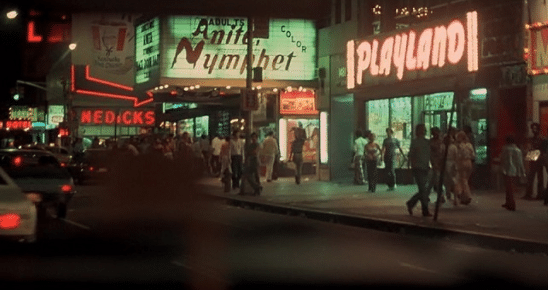
Without rent coming in, landlords take to burning abandoned buildings to get insurance payouts, while the chaos and violence escalate such that fire fighters are hammered with bricks as they try to extinguish the flames.
New York City, 1976
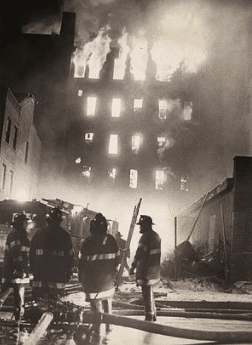
Gritty, grimy, and hostile, the city that never sleeps is suffering from moral burnout and dysfunctional exhaustion. It is on a path of self-destruction so powerful and unstoppable that junkies, murderers, and pimps rule the seedy underworld at night.
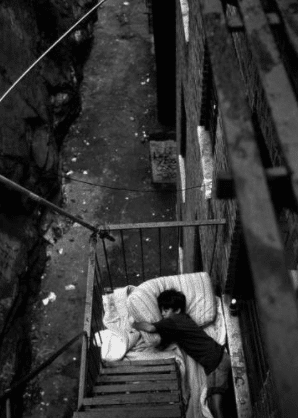
Things have become so dire that a Survival Guide pamphlet is published and handed out to visitors – WELCOME TO FEAR CITY (formerly known as Fun City) – warning them to stay away from New York City. It also gives tips on how to get out alive if they don’t heed the advice:
- Stay off the streets after 6
- Remain in Manhattan
- Avoid public transportation…
According to Judith Cummings of The New York Times, the flagrant prostitution of young girls in Times Square in the 1970s had become so prevalent that a “Pimp Squad” was created in order to fight it. At one public hearing, held by the State Assembly’s Standing Committee on Child Welfare, “three former teen-age prostitutes” testified that, in some parts of the city, girls as young as 9 or 10 were frequently recruited to the streets.
This, despite the efforts of the Pimp Squad to hand out police leaflets that read, “Attention prostitutes of New York. Are you tired of: Giving all your money to your pimp? Getting beat or abused when you don’t make your trap? Living on $5 a day while your man snorts the stack up his nose?”

This “old” fractured city seems a fitting place for Travis Bickle, given that he too seems broken and bankrupt. But unlike New York with its open displays of sex, crime, and urban decay, Travis seems ruined on the inside – drained and devoid of both spirit and soul.
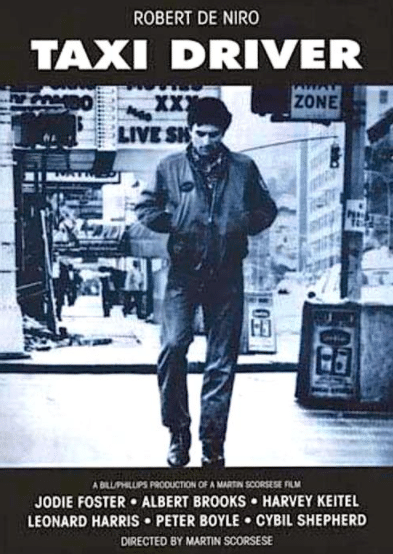
====
BEFORE WE GET INTO TRAVIS BICKLE:
As I’m sure you know, Taxi Driver is often referred to as a Psychological Thriller, but I respectfully disagree.
HERE’S WHY: Taxi Driver is missing too many of the essential components that comprise the Thriller Genre, including its most important and defining scenes. Here is a rundown:
- There is no inciting crime. There is a city full of crime, but there is no event that incites the story that is an actual crime. We could argue that seeing Iris the child prostitute is the crime, but that doesn’t happen until Act II. Or we could assume that Betsy dumping Travis is “the crime,” but it’s a bit of a stretch to call that a crime exactly. Betsy is just simply turning him down.
- The villain doesn’t make “his” crimes personal. No villain (in Travis’s interpretation of such: almost everyone including the city itself) is making anything personal towards Travis, not even Sport – until Travis attacks him. The villain (in every case) is almost oblivious to Travis.
- Neither of the Controlling Ideas of Thriller work for this story:
- Positive: Life is preserved when the protagonist unleashes his/her special gift – Nope. People die when Travis unleashes his gift.
- Negative: Death or Damnation triumphs when the protagonist fails to unleash his/her gift – this would work if Travis didn’t unleash his gift (because he would be living in damnation), but he does.
- There are no investigative red herrings because there is no inciting crime
- There is not much of a clock. We can think of Travis as a ticking time bomb, but we have no idea when it will go off.
- The CORE EVENT is not a Hero at the Mercy of the Villain scene.
- The CORE EVENT is a GUNFIGHT (Western Genre) that our Antihero starts and that the “villains” had no idea was coming because they didn’t know there was a problem. Also our Antihero is the aggressor of that scene.
Here are the parts of the Psychological Thriller that do work in this story:
- There are two endings. 1. Travis seems to die. 2. Travis comes out of his coma and has been made a hero by the press, his buddies, and others.
- There is a psychological part to it, as we see Travis spiral into psychosis (Paul Schrader’s word for it), but does that mean it has to be a thriller?
- No. “Psychological,” as Shawn explained on the Roundtable Episode The Girl on the Train (the link is below), can be applied to anything where there is an internal genre present.
- These are his exact words: You could call anything psychologically suspenseful that has any kind of internal genre attached to it… usually these internal genres are based upon revelation, punitive, disillusionment… so the protagonist is in search of answers to a psychological dilemma which is...
Fill in the blank.
In Travis Bickle’s case: How can I find a purpose that will give my life meaning and stop this aching loneliness?
It seems that the words Psychological and Thriller go together very well in the story world of genre fiction, and maybe that’s why we find it confusing. After all, it does take some analysis to find out what genres are actually at play in a lot of stories.
But, shouldn’t the “psychological part” fit with other genres too? According to what Shawn has said, yes!
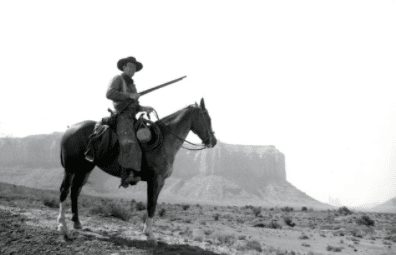
Consider this: during the shooting of Taxi Driver, Scorsese kept thinking about the movie The Searchers and how similar its lead character Ethan (John Wayne) was to Travis Bickle. So I went searching myself and found this little gem: (pay most attention to the 3rd paragraph)
Jeffrey A. Spicer: The Changing Face of the Western: An Analysis of Hollywood Western Films from Director John Ford and Others During the Years 1939 to 1964
“… A third category of the Western began to take form after World War II, when all faith in modern society and progress seemed to fade into a dismal skepticism about whether mankind was truly evolving into a better state of existence. This doubt in humanity started with the war itself and was made worse by the atomic bomb. Images of the western community changed accordingly, which also affected the hero’s motivation and sense of mission. Hence, the “psychological” westerns of the late 1940s and 1950s displayed the hero’s largely ineffectual efforts to handle his growing incompatibility with civilization as well as the weight of society’s unreasonable expectations.
High Noon and Rio Bravo would fit into the category of a Psychological Western because they both portray struggling heroes failing to receive assistance from the inept townspeople. This is a key indicator of not only a certain disillusionment with fellow humankind, but also serves as a commentary on the isolation of modern life.
Winchester ’73 would fall under the category of Psychological Western because it uses the landscape to portray the inner workings of the protagonists’ mental state. “The terrain is so coloured by the action that it finally seems an inner landscape, the unnatural world of a disturbed mind” (Kitses, 1969, p. 72). These psychological presentations “display the formal and stylistic characteristics of the traumatic mindscape…” (Walker, 2001, p. 225). This is the case in The Searchers, where the characters suffer great trauma and are changed by it, becoming more bitter and selfish. In this way, the Psychological Western is driven largely by internal struggles rather than the rip-roaring climactic action sequences of earlier Westerns.
The link is at the end of this post.
I believe that Scorsese made a Psychological Western, rather than a Psychological Thriller, and I will show you why using the Obligatory Scenes and Conventions of The Western Genre.
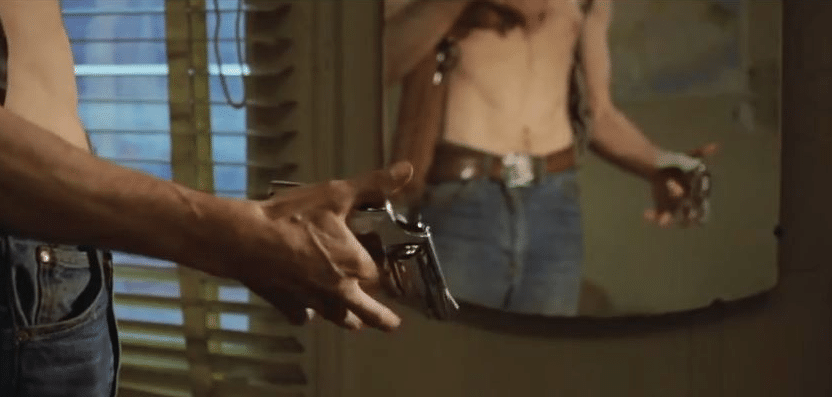
I’ll bring in other genres too, because they are essential to the story and to the WESTERN GENRE itself, but only the most important ones like LOVE and STATUS; there is so much going on in this film that I could probably make a case for almost all of the content genres, but I would be writing a book.
At first the LOVE and STATUS genres dominate, but as we move forward, you will find that the Western really picks up the pace and pushes the story to its CORE EVENT: The GUNFIGHT all the way to the end.
THE WESTERN STORY is, according to Shawn Coyne, a “combination of crime, society, and action in which the individual is both condemned and exalted by society. A sub-textual Jesus or Savior myth lies under the gunfighting.”
“The western story concerns the role of the individual in a mass society. Is the self-reliant individual dangerous to order or necessary to defend the powerless?” —Shawn Coyne
To me, TAXI DRIVER is a WESTERN > VENGEANCE Story – (a stranger comes to town to right a wrong).
SPECTRUM OF VALUES FOR THE WESTERN GENRE:
THE GLOBAL VALUE of The Western is: Freedom vs Subjugation
If you don’t understand Value Shifts or need a refresher, this might be a good time to brush up by going here:
WE’LL START FROM THE BEGINNING OF THE FILM:
ROLL CREDITS:
A jazzy score – composed by the late Bernard Herrmann of Psycho, Vertigo, and Obsession fame – stirs sadness and a sense of foreboding in the viewer.
Herrmann was known for writing dark music and Scorsese wanted him, and only him, because he wished to create the same dread in this film as those of the HORROR films that he loved. Scorsese also contributed to the horror style in Taxi Driver with filming techniques that accentuated Travis’s paranoia and his looking a bit monstrous at certain moments.
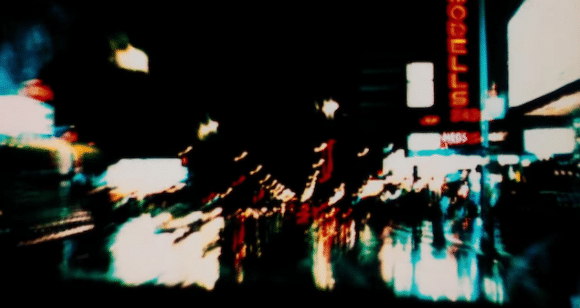
We find ourselves behind the wheel of a car, observing a multi-coloured-glaze of bright neon being washer-wiped across the windshield during a light spring rain. We see what the “driver” sees when he “hacks” alone at night.
His understanding of this world has a garish blur. He doesn’t seem to see it clearly; his perspective is off – a bit disturbed perhaps, puzzled, and dreamy.

END CREDITS
At the beginning of the film, decked out in plaid shirt, big-buckled belt, jeans, and cowboy boots, Bickle seems like the type of lonesome cowboy that wanders into town and keeps on going, but the truth is that he has been drifting in and out of New York’s highest danger zones at night – for how long we are not sure. He is a complete mystery.
Today Travis has decided to apply for a job as a Taxi Driver. The Personnel Officer asks why he wants to “hack.” We find out that he can’t sleep.
I ride around nights mostly… I figure, you know, if I’m gonna do that, I might as well get paid for it.
“You wanna work uptown nights? South Bronx, Harlem?”
Given that Travis perpetually travels across all the hostile and lawless plains of New York’s decrepit areas already, it is a perfect fit:
Anywhere, anytime.
“Military record?”
Ashamed of his answer:
Honourable Discharge. May ‘73
Travis has already gone through a WAR STORY (Vietnam).
Since the people “at home” (the U.S) had been fed media stories and images of the brutal and senseless violence that their very own military had participated in over there, adding even more chaos, confusion, and horror to the narrative of a meaningless war, the veterans returning home were met with rejection and disrespect.

It is probably safe to assume that Travis has been dealing with his own Defeat with Dishonor ever since.
SPECTRUM OF VALUES FOR WAR GENRE
His service makes him feel shame. Travis is isolated. Vietnam is his dirty little secret and he has no outlet for the resentment he feels towards the public who probably seem hypocritical and unjust.
Despite Travis’s barely mentioned backstory, that we are free to imagine for ourselves, Both Schrader and Scorsese were emphatic that Taxi Driver not be about what war does to people. To them this is not about Travis having PTSD. Their message was and is about what loneliness and isolation does to people.
Schrader explains that he wrote it as a kind of therapy:
“I fell into a depression where basically I was living in my car… I went to an emergency ward… and when I was there I realized that I hadn’t talked to anyone in almost three weeks. And I had just been living alone at night, going to pornography and living in myself… what I had become was like a taxi driver, a man who was locked in this iron coffin, wandering around in this nightmarish world that he was inventing…”
“And the psychological reality is that this person is creating the nightmare.”
Travis has been traveling around the city, without purpose and feeling that his life has no meaning. So, his starting point in this story begins low in the Worldview Genre also:
WORLDVIEW GENRE: “The Worldview Maturation Story is essentially the Hero’s Journey. All stories have maturation built into them as each story’s change arc requires the protagonist to shift their point of view in order to attain wisdom or experience.” “WORLDVIEW is an arch-plot (Hero’s Journey) or mini-plot (multiple characters) internal genre, showing the process by which cognitive dissonance upsets the balance of a character’s life, requiring a shift in their view of reality.” —Shawn Coyne
SPECTRUM OF VALUES FOR WORLDVIEW GENRE:
Travis has been living his life in NYC feeling meaninglessness for his service and his life. He also feels disillusionment in his fellow citizens.
WESTERN – Convention: Hero, Victim, Villain: These three roles must be clearly defined throughout the story.
In the beginning of this story, Travis starts as a Victim feeling very low and he feels that “the people” of New York have a lot to do with that; he hides his Vietnam story out of shame.
The major Villain, at this point (in Travis’s mind) is society at large – especially in New York, but a few people step out here and there to represent the whole; he disconnects as much as possible and turns his bad feelings back on them, judging them from a short distance, but this also makes him feel lonely and isolated.
There isn’t much of a Hero in here yet, but Travis probably has a sense that it should be him. He most likely feels like a failed Hero (antihero trait). He just can’t seem to step up to the plate yet, so he glares and tells his diary all the bad things he thinks about the “scum” of New York.
But, in the interview for the taxi driving job wherein he reveals that he was a Marine, the Personnel Officer lets Travis know he was a Marine too and he does give Travis the job; The Personnel Officer is the most heroic person for now.
STATUS GENRE:
“The Status story concerns a single protagonist’s quest to rise in social standing and the price he or she must pay in order to do so.” The STATUS STORY is an arch-plot (Hero’s Journey) or mini-plot (multiple characters) internal genre that explores social mobility and the nature of success. —Shawn Coyne.
SPECTRUM OF VALUES FOR STATUS GENRE:
Travis is coming from a place of failure. They lost the war
LONELINESS: According to Kendra Cherry of verywellmind.com, ” regarding chronic loneliness, Maslow suggested that people need both esteem from other people as well as inner self-respect. Both of these needs must be fulfilled in order for an individual to grow as a person and achieve self-actualization.”
If you look at the Gas Gauge of need below, You will see the Status Genre positioned across from the Esteem tank. Loneliness is connected to self-respect and 3rd party validation.
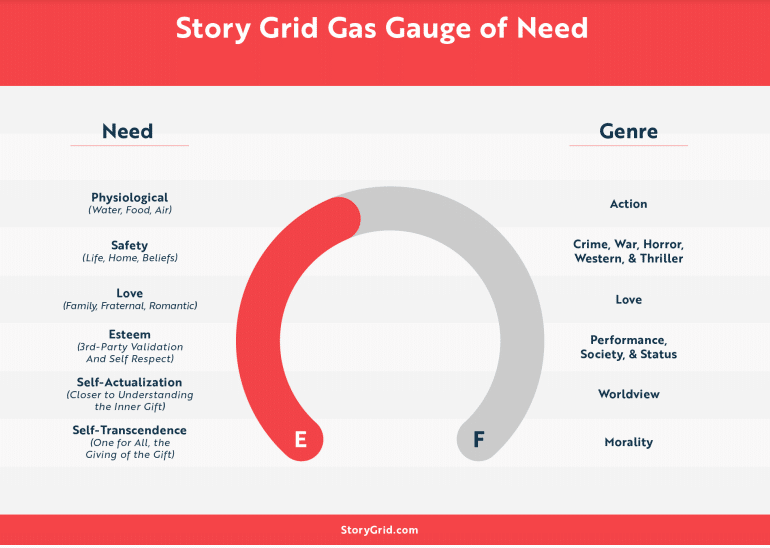
STATUS GENRE: Since Schrader’s intent with this film was to show the effect loneliness and isolation has on people, I tracked this trait down through this genre.
We all have our own ideas about success. It seems that Travis isn’t interested much in material things. But he does care for the esteem of others and he has been rejected at this point by society. To him, not coming home a Hero matters. Being rejected and humiliated is intolerable and he is isolating himself as a result, which of course leads to more loneliness.
We continue to see Travis’s low status when we enter his very shoddy and unkempt apartment. Again he doesn’t seem to mind, but others like Betsy, when he meets her, might take one look at that apartment and be out the door. That would matter to him – the rejection.
We can hear yelling from neighbours, the phone has been ripped off the wall. It probably hasn’t been painted since it was built and is eerily devoid of furniture or anything that would suggest a hobby or interest in something that moves him. He doesn’t really have a lot going on that could give him self-respect.
He also has a single bed which would suggest no sexual or romantic partners are in his life. We may feel pity for him at this point, but we barely know him yet. His food consists of Doritos and coke. He doesn’t take care of himself in any way. Not his body, nor his mind.
POINT OF VIEW AND NARRATIVE DEVICE:
However, it is here that we are taken into his FIRST-PERSON point of view, as he writes in his diary (May 10th), and as we hear his thoughts through the use of Voice Over (VO). This takes us into the mind of Travis and we get intimate insight into the way he experiences the world.
This narrative device of using a voice-over to tell his thoughts to his diary hooks us into his story even further – almost like it is our story – and we feel empathy for him, we understand his pain, even if we disagree with his blatant prejudices and harsh judgements of others who are just trying to survive New York’s shadiest nighttime streets:
Next, we drive all over town with him, picking up all kinds of strangers and, as he observes the people on the street, darkness seeps into his voice over (VO):
All the animals come out at night – whores… dopers, junkies
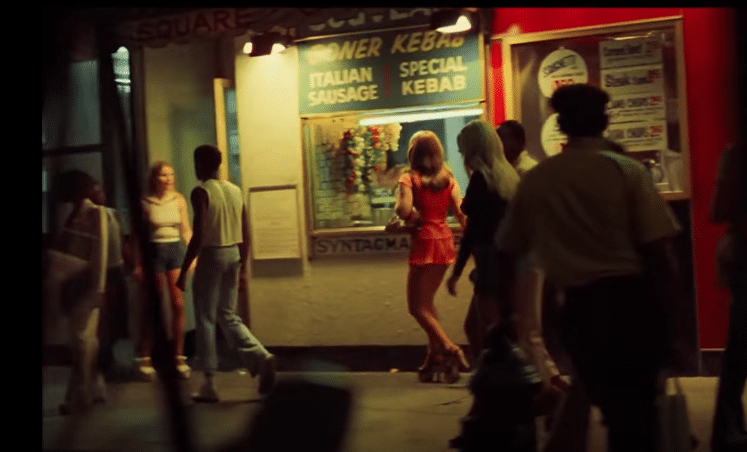
Someday a real rain will come and wash all this scum off the streets.
Again, we see his focus on STATUS, as he judges people whom he believes are below him. He subconsciously feels so low that he has to go to the dark underbelly of NY to find people to be above.
Despite his hatred for these “animals,” he seems to find himself in their company often. Perhaps the truth is that he feels more comfortable out there with the “sick” and the “venal.” He likes being in their environment; maybe they are the only ones he feels superior to, or perhaps because he belongs with them and subconsciously feels they are his own kind, but his self-hate won’t allow him that awareness.
Scorsese says he keeps putting himself in hell. “Why would he wanna drive a cab in New York – at night?” Scorsese says Travis keeps putting himself in the war-zone and “the more he puts himself there, the more obsessed he gets about it.”
By putting himself in a cab he has further distanced and isolated himself from even the “animals,” as before this he would at least have had some kind of contact while he traveled on public transport. Now he only sees them in his rear-view mirror or through the windows.
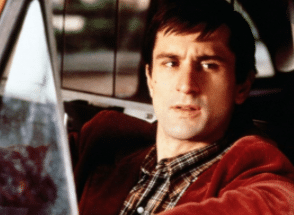
We feel his loneliness even more as we realize that he doesn’t really talk about himself to anyone. He just puts it all into his diary, but his hatred is building as he still visits the most hostile reaches of New York.
WORLDVIEW:
Travis finds the sleaze on the streets disgusting and finds it continuously difficult to find any meaning for his own life when he is surrounded by the “filth” of prostitution and crime.
He feels insignificant – even with a job as a taxi Driver, because most passengers act like he isn’t even there.
His existential crisis is starting to wear on his psychology. Picking up prostitutes in his cab and watching porn underscore his loneliness even more. He’s quite lost, as he hates one and indulges in the other…
When Travis gets back to the taxi garage, it is a relief. He pops bennies (in the script) before getting out. No wonder he can’t sleep. Bennies are uppers, stimulants. We are just starting to see that Travis does indeed create his own problems.
“Each night when I return the cab to the garage I have to clean the come off the back seat. Some nights I clean off the blood.”
His STATUS seems almost lower than when he began “hacking.” Travis, despite having a hate-on for these people, has to clean up their very intimate bodily fluids. Travis is working one of the bottom-of-the-barrel jobs where life and death stakes are coming into play (ACTION GENRE), presuming that the blood comes from some kind of violence and given that he’s entering the underworld every night where his customers are prostitutes, pimps, and drug dealers.
Then when he has finished his shift, he goes to a pornography theatre and asks the woman behind the concession stand what her name is. She rejects him and threatens to call the manager, at which point he backs off. Travis must feel pretty useless and unwanted if even the girl who works at the porno doesn’t want anything to do with him. She clearly thinks he is a lowlife (Incidentally this woman is Diahnne Abbott, who became Robert DeNiro’s first wife).

Travis walks into the theatre; he’s staring at the screen as if in pain. It’s not enjoyable. He’s thinking:
12 hours of work and I still can’t sleep. Damn. The days go on and on. They don’t end.
Another reference to the meaninglessness of his life. He continues the monologue at home on his bed, doing nothing.
“All my life needed was a sense of direction, a sense of someplace to go. I do not believe one should devote his life to morbid self-attention. I believe that someone should become a person like other people.”
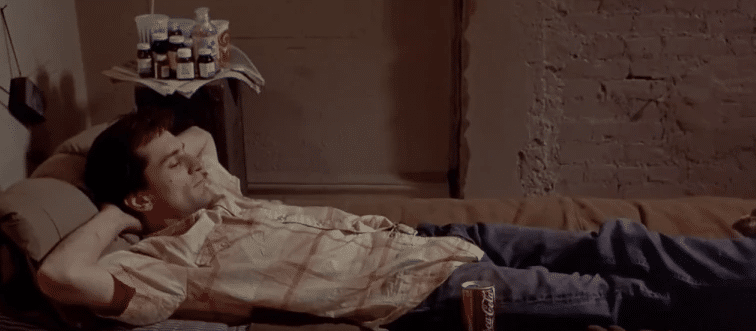
These are some of the saddest lines in the whole script. Travis doesn’t see himself as a person or a somebody. That is pretty low self-esteem. It’s like he’s just an automaton or machine who drives sinners around in his cab. Yet, all he does is to devote his life to morbid self-attention. But then:
I first saw her at Palantine Campaign Headquarters… She was wearing a white dress
She appeared like an angel out of this filthy mass.

LOVE GENRE:
“Love stories give us prescriptive (positive) and cautionary (negative) tales to navigate love’s emotional minefield. They give us tools to try out to attract a mate and behaviours to avoid. — Shawn Coyne
The LOVE STORY is an arch-plot (Hero’s Journey) or mini-plot (multiple characters) external genre. It is centered on romance with the possibility of sexual intimacy.
Just as Travis doesn’t yet see himself as a person, he hardly sees Betsy as a person either. She is a Goddess, an Angel. And he is instantly smitten, completely infatuated.
LOVE GENRE: > OBSESSION
- Obsession (Psychological Driver – Desire)
In the Obsession Love Story one of the lovers has such a shallow but intoxicating passion for the other that the Life/Death value comes into play. Obsession Love Stories are cautionary. They don’t progress beyond the Desire value, and usually end in tragedy.
SPECTRUM OF VALUES FOR THE LOVE GENRE :
In the campaign space, we see Betsy’s pull on men, as she bosses her (also smitten) co-worker Tom around with ease while he tries to make her laugh.
However, she does notice Travis, who is lurking in his cab, staring at them from across the street, which is kind of creepy.
Schrader: He is like a lone wolf watching the campfires of civilization from a distance.
Betsy:
“That taxi driver’s been staring at us.”
Which prompts Tom to “be the man in this relationship” and go to scare him off.
Betsy playfully wishes him luck.
LOVE GENRE – Convention of Triangle:
Tom easily scares Travis off and we begin to see his strained relationship with men – not all men, but men who seem to threaten his sense of manhood, who get close to women easily, or who offer some possibility of sexual or violent threat to him. Other so-called alpha males. We already saw him scurry away at the theatre at the mention of a male manager, and here is another interloper: Tom.
WEST SIDE RESTAURANT 3.30 a.m
Travis meets three cabbies for coffee: Wizard is telling a tall tale about a sexy fare whom he allegedly had sex with. They all laugh. Wizard introduces Travis to the others: Dough-Boy, Charlie T.
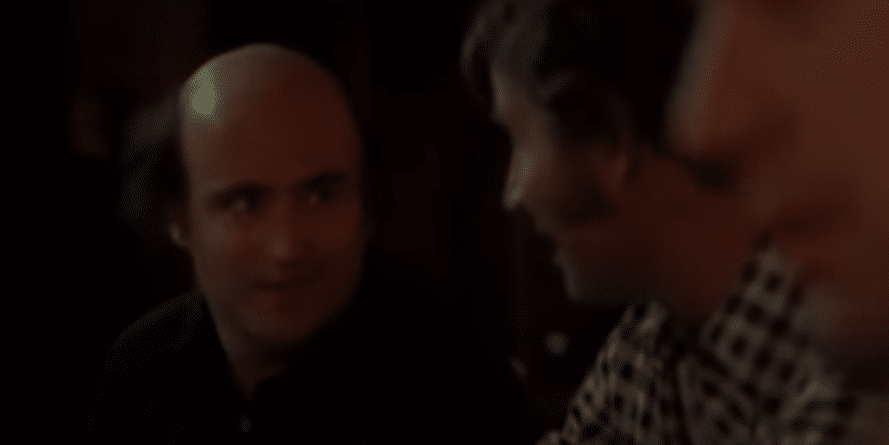
Travis looks at Charlie T. with suspicion.
When one of them asks Travis how it’s going, he finds it hard to respond at first, but finds his way to focussing on some violence and drama.
Some fleet driver from Bell just got all cut up.
Dough-Boy: Stick up?
No, just some crazy fucker. Cut half his ear off.
Travis gets distracted by some extremely well-dressed black men. He appears to find them intimidating.
Dough-Boy has to call him back out of a reverie.
“You run all over town don’t you, Travis?
Travis?”
Huh?
“I mean you handled some pretty rough customers.”
Yeah, I have.
“You carry a piece?”
No.
“You need one?”
Nah.
“You ever need one I know a feller that kin can Getcha a real nice deal. Lots of shit around.”
Travis puts Alka-Seltzer in his water and his gaze gets lost in the fizz…
LOVE GENRE – Convention of Helpers and Harmers
We don’t see this yet but this offer of a piece from Dough-Boy will come into play later when things turn sour with Betsy.
INT. PALANTINE HEADQUARTERS – DAY
Betsy taunts Tom playfully with a match trick. Tom is up for it but fails.
ACROSS THE STREET FROM PALANTINE HEADQUARTERS – DAY
Travis gets out of his car in a wine-coloured jacket, shirt and pants. Even his cowboy boots have been shined. His hair is combed and he looks handsome. He strides across the street and goes inside.
LOVE GENRE – Obligatory Scene – Lovers Meet:
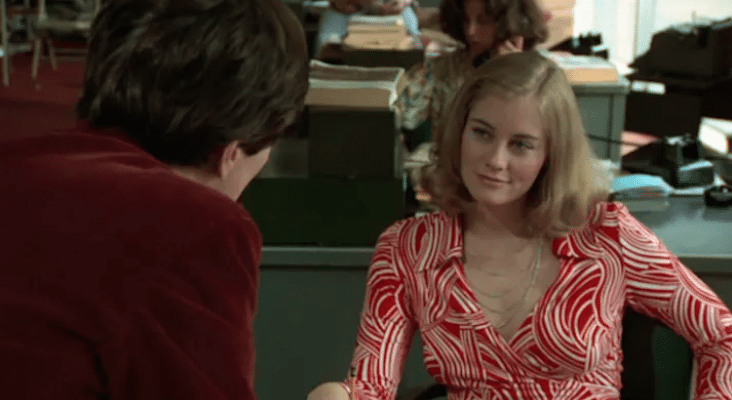
He strides towards Betsy and we see her and Tom take him in. Travis leans towards Betsy:
Hi. I’d like to volunteer.
Tom jumps in:
“Great. I’ll take you over here.”
But Travis breaks up the TRIANGLE right away:
It’s all right. I’d rather volunteer to her, if you don’t mind.
Tom leaves smiling like there is a joke between him and Betsy:
“Why do you feel that you have to volunteer to me?”
Because I think you are the most beautiful woman I’ve ever seen.
They get through the awkward and delightful conversation where Betsy has all the power but is secretly flattered. She interrogates Travis on Palantine; he knows absolutely nothing. She finally asks him what he does want?
Would you like to come have some coffee and pie with me?
Why ?
I think you’re a lonely person. I drive by this place a lot and I see you here. I see a lot of people around you and I see all these phones and all the stuff on your desk; that means nothing. Then when I came inside and met you, I saw in your eyes, I saw the way you carried yourself that you’re not a happy person. I think you need something; if you want to call it a friend you can call it a friend.
He just told her a lot about himself in a 70’s cult leader kind of way.
Betsy stalls…

She agrees to meet Travis at 4 P.M.
LOVE GENRE – Convention – Secrets the couple keeps from society (e.g., they don’t tell their friends about the relationship)
- Betsy doesn’t tell Tom she’s seeing Travis later.
4 P.M. Travis and Betsy go to Child’s Coffee.
LOVE – Convention – Secrets the couple keeps from one another (e.g., the Rival, past or present sins)
In the script Travis lies about his apartment and his service in Vietnam. In the movie it is a bit more subtle. His shame is at play again here. The way he talks to her is such a contrast from how he talks to Iris when they go for coffee later, as he is out of his league here, but Travis knows Iris’s world all too well and is more comfortable with her.
They have an awkward conversation where Travis tries to be lighthearted and witty, but Betsy misunderstands him. He changes the subject and asks her if she likes the guy she works with. She says he’s okay. Travis thinks Tom’s energy goes in all the wrong places, but that with the two of them:
I felt that there was an impulse we were both following. So that gave me the right to come in and talk to you, otherwise I never would’ve thought that I had had the right to talk to you or say anything to you; I never would’ve had the courage to talk to you. With him I thought there was nothing and I could sense it…
Travis talks about something else and then gets back to Tom again.
I don’t like him… I think he’s silly… I don’t think he respects you…
And Betsy, taken aback a bit:
I don’t believe I’ve ever met anyone quite like you.
She also nails one of his most common traits when she mixes up lines from the Kris Kristofferson song, “The Pilgrim: Chapter 33”
“He’s a prophet and a pusher
Partly truth, partly fiction
A walking contradiction.”
We have already seen some of Travis’s contradictions, but there are some other things that seem quite off with Travis in this discussion, that Betsy decides to dismiss – possibly because he is so charming and handsome:
- Travis is having his first date and he is already showing signs of jealousy and competition with her co-worker. (STATUS)
- In his dialogue with her he is assuming that she too was following an impulse before he came into the headquarters to ask her out, but in fact she was oblivious to him. This is the Partly Truth, Partly Fiction part wherein Travis is already blending fantasy with reality.
We are starting to see the cracks of Travis’s disturbed psyche.
LOVE – Convention of Moral Weight
Love Stories are morally loaded. Those who cannot love have some moral failing. In order for them to live happily ever after they have to get over the moral failing by story’s end.
According to, Rachel Fredericks, jealousy is a moral issue:
In her dissertation, Troubling Others and Tormenting Ourselves: The Nature and Moral Significance of Jealousy, Rachel Fredericks finds that jealousy undermines the actual or potential moral value of the jealous subjects’ relationships… We have good reasons to see jealous subjects as worthy of moral criticism but not moral praise.
LOVE – Convention – External Need
There must be something outside the romance that is driving the actions of the main characters
- Travis NEEDS acceptance, self-esteem, and third-party validation, admiration (STATUS GENRE)
- LOVE – Convention of Helpers and Harmers
- There must be characters for and radically against the relationship. Those in favour of the match help out, and those opposed to it will do everything to destroy it.
- Travis is his own worst enemy. He is a harmer to his own possibility of a relationship. He has chosen someone so far out of his league that they have nothing of substance to talk about at their coffee date and, although she is attracted to him, it will most likely fail. His diary reports are full of descriptions about what he and she ordered to eat at the cafe.
- We mentioned Dough-Boy already but he’s not a conscious harmer. He’s more like an unaware accessory. He offers the option to buy guns because of the danger Travis puts himself in every night
- Tom is definitely a harmer, although he doesn’t seem like a malicious character. He just wants Betsy for himself and he is protective of her.
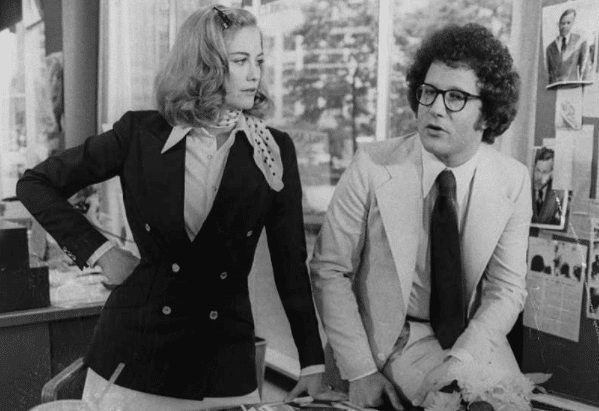
STATUS – Obligatory Scene: An Inciting opportunity or challenge:
and
STATUS – Obligatory Scene: Forced to adapt to a new environment, Protagonist relies on old habits and humiliates himself or herself: (I feel that he also meets this obligatory scene with Betsy in the porn theatre).
and
STATUS – Convention – Big Social Problem as subtext (Racism, Misogyny, Class) The city is falling apart, is filled with crime, Feminism challenging the status Quo, prostitution is rampant, Drugs everywhere. People are afraid to come to New York. New York is on the brink of bankruptcy. The mob controls everything….
INT. TRAVIS’S CAB
Charles Palantine gets into Travis’s taxi. Travis recognizes him and gets excited. He tells him that he tells all his customers to vote for him, which is a lie.
Palantine, previously discussing being uneasy about taking a cab and not a limo, asks what bothers Travis the most about the country:
…this city here is like an open sewer, you know. It’s full of filth and scum. And sometimes I can hardly take it. Whatever-whoever becomes the President should just… I think that the President should just clean up this whole mess here. You should just flush it right down the fuckin’ toilet.
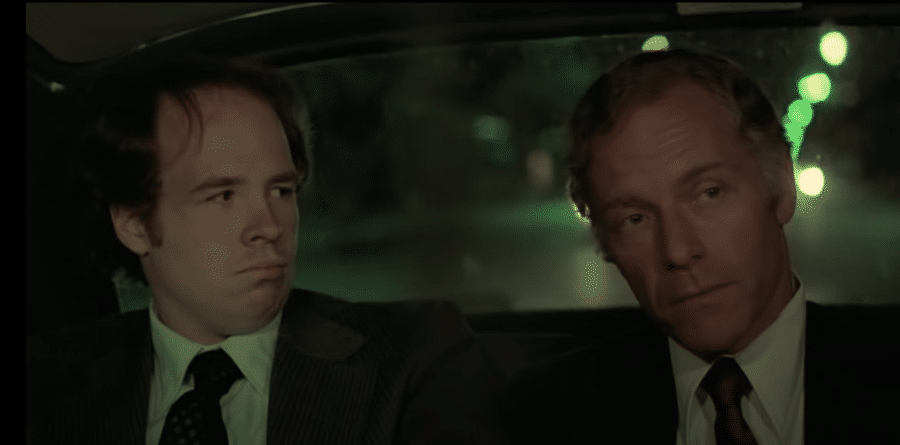
Palantine, at first speechless, realizes this guy is way off his message and he gives his best political platitudes. He then gets out of the cab to the noise of screaming women – the welcome of a rockstar and the ultimate in status.
Next to Palantine’s smooth sophistication, magnetism, and elegance, Travis’s street-wise ways pale – not to mention the coarse way in which he expresses himself . Although we can see why Betsy is attracted to Travis it is clear again that they are not in the same league. Palantine is the kind of guy that Betsy would wish to marry.
STATUS – Convention – Strong Mentor Figure
If Travis were a little less self-centred he might have been able to recognize the opportunity that Palantine could offer as a person to model himself after in order to raise his status.
N.B. Although this is a convention for the Status Genre, in his book: Myth and The Movies, Stuart Voytilla writes about the “Mentor Within” for WESTERN Stories: “The lonely Western Hero (Antihero) must rise to take the law into his own hands. In many Western Journeys, the Loner Hero is without a physical mentor, relying instead upon his Inner Mentor, his moral code, his integrity, his uncompromising belief of right and wrong.“
Voytilla continues,
“The strength of his moral code may be what is at stake … A hero, Antihero, or Wounded Hero may be in moral conflict, yet the Ordeals of his Journey resurrect this Inner Mentor, and he finally serves Justice.”
LATER
MORALITY GENRE – Obligatory Scene – A shock upsets the hibernating authentic self.
Travis pulls up on the street. As a fare leaves his cab, a young girl gets in.
C’mon man. Get me outta here, All right?
Travis turns slowly to take her in: 13? 14? Face of a baby, lots of makeup, floppy hat. Desperate…
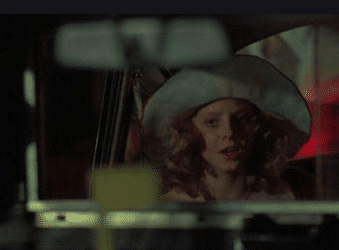
Come on!
Before he can react, a man’s voice reasons:
Come on, baby. This is a real drag.
The girl throws herself away from the side door but the man reaches in to grab her:
You wanna get busted? What’s up, bitch? Be cool!
Travis watches in his mirror with horror as the man half sweet-talks her, half drags her out of the cab. Only the guy’s muscular body can be seen and it’s pretty obvious that he’s her pimp.
Travis remains frozen, watchful.
But he doesn’t do anything.
WESTERN – Obligatory Scene – Hero Sidesteps responsibility to take action: Travis just met one of the city’s worst villains and yet Travis is completely paralyzed – identification with the victim. He isn’t yet ready to be the Hero, but it’s on his radar.
The girl gets back out still trying to pull away from her pimp, who throws a 20 in on the seat beside Travis, saying:
Cabbie, just forget about this it’s nothing.
WESTERN GENRE – Obligatory Scene – Discovering and Understanding the MacGuffin: (Villain’s Object of Desire) He realizes that this filthy City – this “open sewer” that he lives in and all its inhabitants, and especially Sport right now, want to degrade, deflower and pervert everything and everyone that is pure and clean.
MORALITY – Obligatory Scene – The protagonist expresses inner darkness with an overt refusal of the hero’s journey call to change.
and
WESTERN – Convention revisited: Hero, Victim, Villain: These three roles must be clearly defined throughout.
A true Victim and a true Villain have now come into his life. The girl (IRIS) is a real victim in his mind – a girl without agency, with a guy, a villain, who has a lot of power over her.
She tried to escape but Travis failed to help her. He failed again! He froze… His inner darkness I believe is low-no self-esteem and terror of the alpha male aggressor. Also, because Travis knows of his own power in terms of how he could express himself violently, there is no middle ground for him; he either has to suck it up or fight. So, in this instance he shuts down.
HE CONTINUES HIS NIGHT
He sees homeless people, people smoking crack, litter everywhere, neon everywhere, steam coming out of pothole covers. His car gets egged by kids on the street. He drives off.
At the end of his shift, he’s not cussing or complaining about all the craziness he has experienced. Iris seems to have had a profound effect on him. He looks at the $20 on the seat beside him. He crumbles it up and sticks it in his inner pocket.
ANOTHER DAY:
He walks down the street – a man in a crowd. He is the only one in focus, isolated as usual. He’s wearing his wine-coloured jacket, white shirt and tie. He could be anyone, but it looks like a shot of silent contemplation. He is off to meet Betsy for their second date.
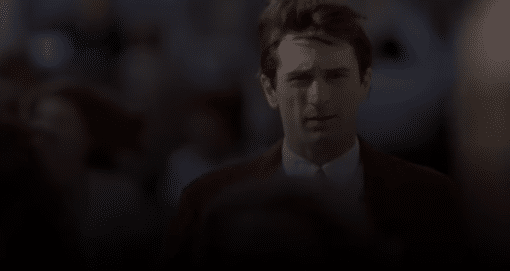
LOVE GENRE – Convention – Gender Divide
The lovers represent a divide between “male” and “female” sensibilities, even in gay and lesbian love stories.
Travis plays the conventional male and Betsy plays the conventional female (up to a point).
- Travis makes the decisions about which movie they will see.
- He picks her up after work
- He pays for everything
- He buys her a gift
- In the scene after this he has bought her flowers
Travis meets up with Betsy at Headquarters and he gives her the Kris Kristofferson album that has the song she quoted on it. They walk to the cinema, but when they get there, Betsy says:
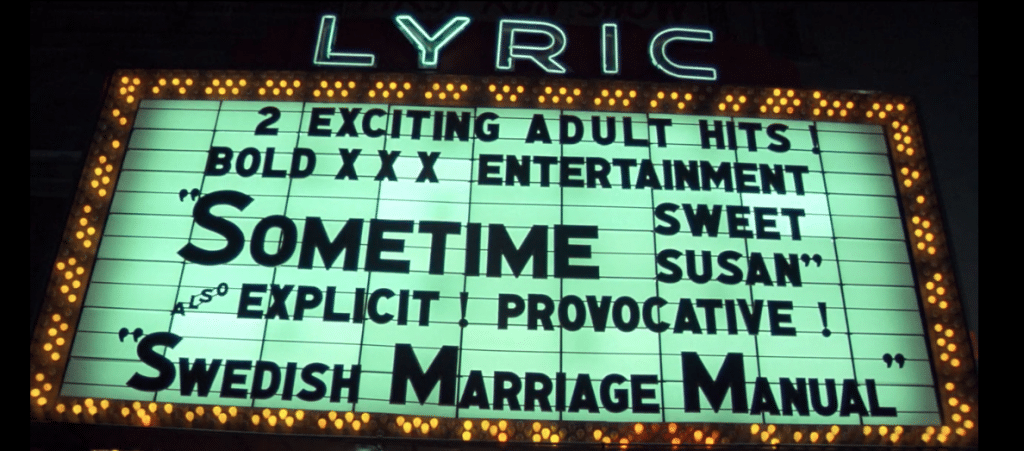
In the script Schrader writes, “Travis seems confused. He is so much a part of his own world, he fails to comprehend another’s world. Compared to the movies he sees, this one is respectable.”
He reassures Betsy, but after a mass orgy clip, she storms out:
We’re just different…
LOVE GENRE – Obligatory Scene – Lovers break up: Not that they are technically lovers, but Travis will take it that badly.
Travis attempts an apology and another option, but Betsy is pissed:
Taking me to this is about as exciting as you saying let’s fuck.
Her use of a profanity take him aback momentarily. Travis tries to rescue the situation but he really is clued out. When Betsy tries to catch a cab, he grabs her arm. Betsy is not only offended by the movie choice, but alarmed at his grabbing her arm, at one point so hard that she has to rip it away from him.
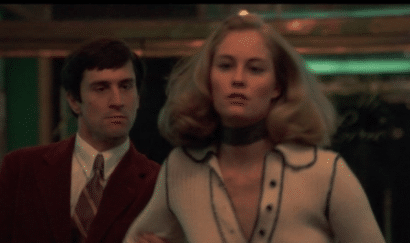
She gets into the first cab that she can.
His reserved behaviour is slipping and we are beginning to see his self-sabotage very clearly. We also see some physical aggression.
LOVE – Convention – Opposing Forces: There must be forces opposing the match. These may be beyond the characters’ control (e.g. social rules, family values) or within the characters’ control (e.g. bad habits, beliefs).
Betsy certainly has specific values that she sees quickly will not match those of Travis. Travis, again, is his own worst enemy. He “should” have known or asked what movie she’d like to see.
One of Travis’s bad habits is porn and this alone is deal breaker enough for Betsy.
Travis’s idea of becoming a person is through having a relationship with someone like Betsy, however Betsy already sees herself as somebody. She doesn’t need to get that from anyone else. They are different.
ANOTHER DAY:
Travis is on a phone call to Betsy. It is a heartbreaking call where he tries to get to see her again. He asks if she got his flowers. She blows him off in every direction and the camera slides away from him as it is too painful to keep watching.
He doesn’t understand that her decision to end the date was final.
At home, he writes in his diary that he called her a number of times, but after the first call she wouldn’t come to the phone.
WESTERN – Obligatory Scene: An Inciting Attack by the Villain or Environment.
Despite Travis’s idealism of Betsy as a pure angel, she rejects him when he takes her to a pornography theatre to see a Swedish sex film. She uses aggressive language, which he wasn’t expecting from her. And she thereon in refuses to have anything to do with him.
This completely upends him. This sends him over the edge. Before this he was restless, judgemental, and bored, but now… his masculinity and desirability have been completely diminished. He is rendered impotent/powerless.
SPECTRUM OF VALUES FOR THE SOCIETY GENRE :
(remember that the society genre is part of the Western genre mashup. It can also be its own genre completely)
WESTERN – Obligatory Scene – Forced to leave ordinary world Hero lashes out.
Betsy directly confronted Travis’s way of life and made him feel like the creep that he thinks everyone else is. She has brought some awareness to him, for a short time anyway, about himself and what is acceptable to her as a free, confident, and modern woman.
But he doesn’t want to see himself as part of the “filth” that he hates in others, even though he is. And definitely not through her eyes.
Also she seems to feel free within the system/society they are living in and he feels crushed by it – emasculated and powerless. He can’t understand why she is so empowered. The only thing to do to get his power back is to lash out at her and take her down a few pegs.
DAYTIME
Travis enters Betsy’s workplace; he marches towards her she looks very wary. Tom tries to keep him from Betsy. Travis confronts her directly:
Why won’t you talk to me? Why won’t you answer my calls when I call you? You think I don’t know you’re here…
Tom keeps ushering him back to force him out the door, but eventually scares Tom by jumping into a back stance à la Shotokan Karate.

Travis walks back towards Betsy and yells:
You’re in a hell and you’re gonna die in a hell like the rest of them.
Tom threatens him with the cop across the street. Travis leaves.
(VO) I realize now just how much she’s just like the others. Cold and distant and many people are like that. Women for sure; they’re like a union.
====
This is quite an extreme reaction. It’s interesting imagery. Travis goes from thinking Betsy is an angel to a fallen angel perhaps. It’s almost Godlike on his part – like he is condemning her to hell.
Travis is getting to the point where he is no longer willing to be anyone’s “victim,” imagined or real. Betsy and Tom are “Villains.” But now Travis – in his own devolving mind – is almost a Hero (because he really let them have it).
It’s a flip. He can go from Victim to Pseudo-Hero in a Nano-second. He is coming undone and is unable to contain his emotions. To the outside he is the Villain, but we are still in his POV.
Schrader describes him as borderline psychotic
And that could be a result of many things. The Bennies – amphetamines (written in the script) can bring on a psychotic episode. Also, he is not sleeping because of the Bennies. He is being ostracized, which can lead one to violence and/or suicide at the extremes. And Betsy was his only chance (in his mind) to turn everything around.
This of course all happened on the heels of being a wimp in the cab with Iris – the girl hooker. He had a chance to be a Hero and rescue this little girl from the street and he didn’t do it.
He is being pushed out of the ordinary world in a way that makes him angry. His ordinary world is riding around looking down on the less fortunate and mind-numbing with porn. Now he’s getting confused and even less in control of himself.
He is usually stoic but now he explodes. He is deep in the dunes of his deranged mind, which has become the hostile landscape – his extraordinary world. Everywhere he looks there is a mirage posing as something good and real until he almost reaches it. And he is getting more paranoid by the second.
NIGHT TIME:
Travis is driving a fare who tells Travis to pull over to the curb. He makes him turn the meter back on and stop writing. He wants Travis to see the woman a few floors up in the window. He tells him that’s his wife, but not his apartment. He tells Travis he’s going to kill her with a .44 Magnum.
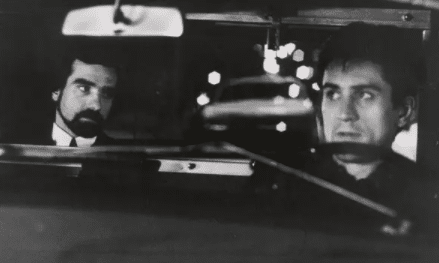
Travis’s eyes in the rear-view don’t exactly betray what he’s thinking. In his twisted mind, Betsy has betrayed him and now he’s listening to a man who intends to solve his betrayal story with a .44 Magnum… and he seems pretty masculine.
LATER AT THE COFFEE SHOP
The taxi cab drivers are telling funny stories about their customers.
Charlie T asks if Travis has the five bucks he owes him. Travis takes a lot of money out of his pocket and sees the $20 from Iris’s pimp to keep his mouth shut. He puts it back. Gives the cabbie $5.00
WESTERN Obligatory Scene: Hero’s initial strategy to outmaneuver the Villain fails: Travis is still haunted by Betsy and his loneliness is growing. Going into her work and making a scene hasn’t helped at all. It didn’t give him the relief he wanted. Nothing good came out of that. In desperation he reaches out.
Wizard is leaving early. Travis follows him out and asks if he can talk to him. This is one of the very few men that he trusts and doesn’t feel threatened by, but he gets distracted by a few threatening scenes on the way. He glares at them.
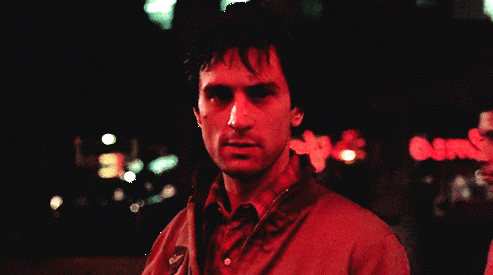
Travis tries to convey where his mind is going without giving his exact thoughts. He tries to explain:
I just want to go out and really… I really wanna… I don’t know. I got some really bad ideas in my head.
We know he is cracking and is afraid of what he might do, but Wizard takes it to mean that things got him down – like the job.
Wizard listens intently. But then he gives him the big philosopher speech. This scene is adorable, but it’s also sad, because Travis really does need help and he’s scared. He wants help. He has no one to talk to. He is isolated and this is the only time he will ask for it.
After a pep talk that barely has anything to do with anything, Wizard tells him to get laid.
“You got no choice anyway. I mean we’re all fucked.”
Travis smirks:
That’s about the dumbest thing I ever heard.
AT TRAVIS’S APARTMENT
Travis is watching Palantine on TV, while he pours peach brandy and sugar on his white Wonder Bread breakfast. Palantine talks about how he has said, “let the people rule.” And he’s more optimistic about that now than ever.
DAY TIME:
Travis drives by Palantine’s headquarters. Betsy’s seat is empty but two soft drink paper cups are there – his and hers.
NIGHT TIME:
Travis pulls over to a curb to let a cab fare out. He drives away and almost hits Iris the girl prostitute, who is crossing the street. She glares at him. He is stunned. She’s with another girl who takes her arm and leads her onward.
Travis trails the two girls in the cab; he looks like a creepy stalker and Iris is bothered by it. As an audience member, we start to wonder about this too. He is so unpredictable right now. He looks angry and is eyeballing her from the side.
The two girls pick up a couple of men and walk away with them.
Pissed, Travis screeches his tires and drives off.
And this is a very strange time for the following:
(VO): Loneliness has followed me my whole life, everywhere. In bars. In cars. Sidewalks, stores, everywhere. There’s no escape. I’m God’s lonely man.
Schrader and Scorsese say he’s attracted to Iris, but he can’t face it in himself. Thankfully it isn’t within his moral code to do anything.
TRAVIS’S APARTMENT
He writes:
(VO): June 8. My life has taken another turn again. The days move along with regularity, over and over. A long continuous chain. Then suddenly there is change.
WESTERN – Obligatory Scene – All Is Lost Moment. Realizing they must change their approach to salvage some form of victory, the Hero reaches an all is lost moment.
As @jblair writes in her post: https://storygrid.com/the-all-is-lost-moment-2/ : “The All is Lost moment is the crucial element of the Middle Build. It’s the pivot point when the protagonist shifts their pursuit of what they want to the realization of what they need.”
Travis is done with failure! And he’s done with playing by the laws of the land. He needs 3rd party validation. He needs people to respect him or think he’s a Hero, or even to fear him. Whatever it takes.
He has tried to operate within society’s constraints and subsequent repression of his true self, but he can’t do it anymore. He will regain his power no matter what and he is willing to die for it.
No more Mr. Nice Guy.
DAYTIME CURBSIDE:
Travis stands on the street drinking alcohol from a paper bag. A cab pulls up. Dough-Boy introduces Travis to Easy Andy – the travelling salesman. Travis gets in.
Andy and Travis walk into an apartment. Andy shows Travis a good variety of guns. Travis asks if he has a .44 Magnum. Andy does. He is the consummate professional. Travis buys the lot.
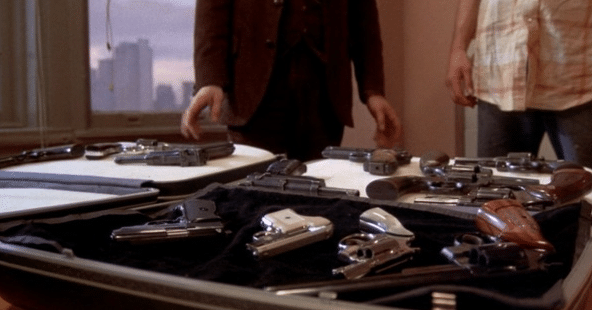
WESTERN – Convention – Hero operates outside the law (selectively or as a matter of course)
Travis has tried to follow the law of the land, despite all the criminals he sees on the street, but it isn’t working for him. He has to take the law into his own hands. He’s traveling towards autonomy. Being regulated by other people’s rules is destroying him. Now life starts on his terms.
Here again is the Spectrum of Values for The Western Genre
A MONTAGE OF TRAVIS IN TRAINING SHOTS to hone his “gifts.”
- Travis does push-ups.

- He does pull ups.
- He flexes his whole arm and clenches his fist over a flame.
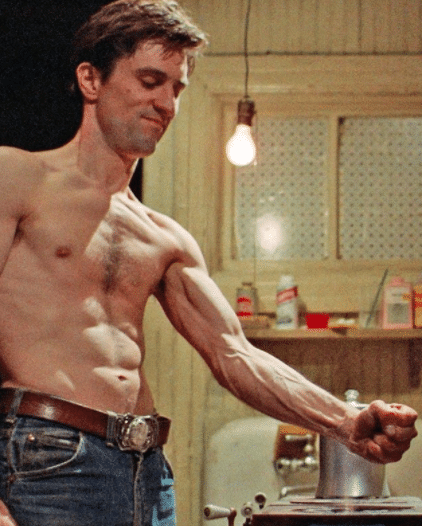
- He’s shooting four different guns at a firing range.
- He’s in the movie theatre watching a porno but using his hand like a pretend gun that he aims at the screen.
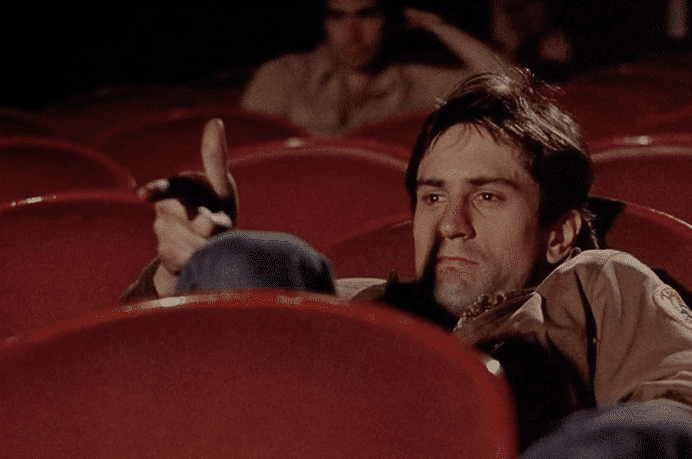
MONTAGE: TRAVIS’S APARTMENT
Travis pulls his guns on an imaginary person in the mirror.
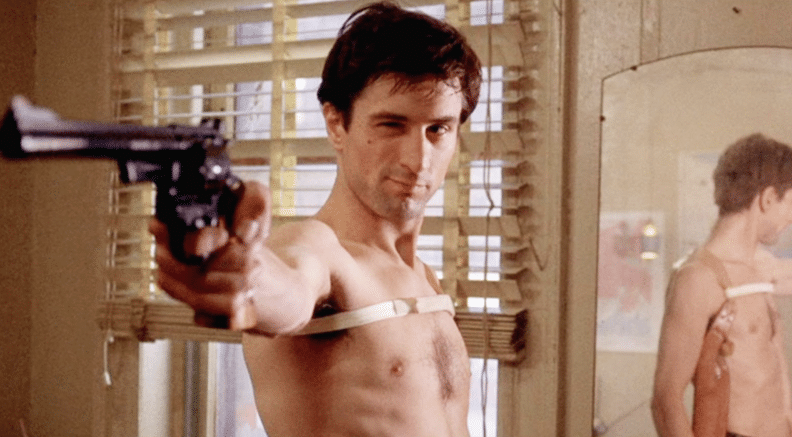
- He watches himself with a cocky smile on his face and keeps moving around the room pulling the gun and putting it back in its holster. He’s practicing like he is a gunslinger from the Wild West.
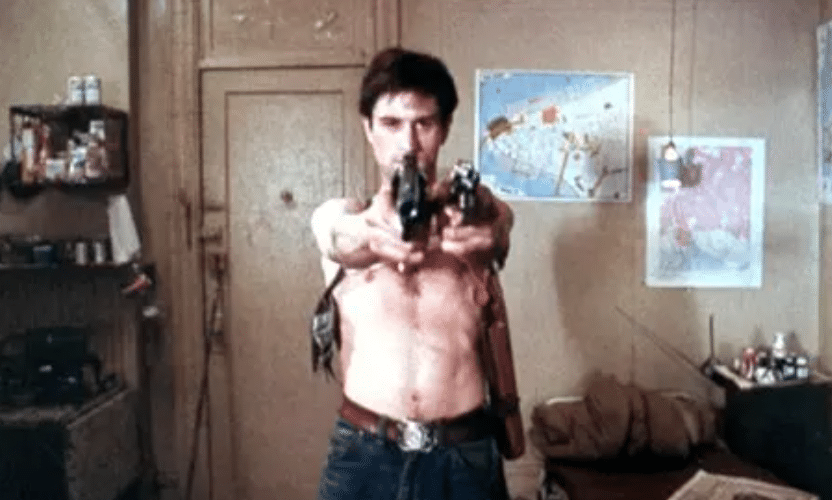
- He’s creates a contraption from a drawer runner (slide) that will allow him to conceal a gun in his sleeve that flies out at the ready with a few simple arm movements
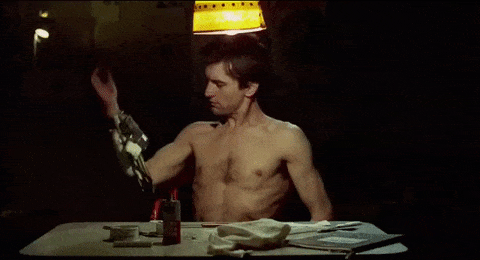
- He falls back on his bed and draws a knife from his ankle.
- He hammers a blade into the top of a bullet creating an X. This will make the bullet split into fragments of shrapnel upon contact creating a more vicious injury. This guy means business – nasty business.
CHARLES PALANTINE RALLY AREA
– Betsy is STRESSED. She is telling people what to do.
– Tom is with a guy who’s testing the mic on the platform.
– Tom calls Betsy. She turns and screams, “What!!!”
DOING RECON:
Travis walks around the crowd with his green jacket on. He is checking it out. Making mental notes of everything. He spots a very obvious secret service guy and decides to play with him boyishly.
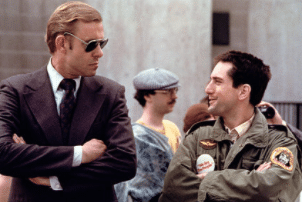
Hi. Hey, you’re a Secret Service man, aren’t you?
I’m just waiting for the Senator.
That’s a good answer… Shit man. I’m waiting for the sun to shine.
This continues until Travis starts asking what guns they carry:
.38s, .45s, .355 Magnums? Something bigger maybe?
The SS guy finally twigs that Travis might be a nut job, but the Senator arrives; Travis walks into the crowd that swarms the car and away.
TRAVIS’S APARTMENT
PRACTISING:
TRAVIS IS COMPLETELY OBSESSED AND LOST IN HIS FANTASY
- Travis is Gunspinning in front of a mirror.
- He puts his jacket over top of his .44 Magnum that is holstered and pressed to the side of his chest.
- Travis Practises his quick draw (“fastest draw in the West”)
- He starts to talk to himself in the mirror, like he’s being threatened by some guy. Only he’s cool. Occasionally he acts like he’s been insulted and draws the gun on the “guy” using the contraption he created that is up his sleeve.
- He talks to the imaginary guy in the mirror:

Travis practices what he will say and do; it almost sounds like he’s writing the report that will quote him in the news. Even while lying on his bed the voice over continues. He is obsessed.
Listen you fuckers you screwheads here was a man who would not take it anymore… A man who stood up against the scum, The c#@&s, the dogs, the filth, the shit. Here is someone who stood up.
- He rolls over onto his side.
- He continues his voiceover as he writes in his journal.
- He is back at the mirror – he pulls the gun on the imaginary opponent one more time and says:
You’re dead.
NIGHT TIME:
WESTERN – convention – Hero operates outside the law (selectively or as a matter of course)
It’s a hot summer night. Travis drives his cab around the corner and stops outside R&M supermarket. A cop car drives past him.

Before Travis enters the convenience store, one of Scorsese’s favourite pieces of the Taxi Driver Score begins. The low, dark peaks of these chords remind him of Psycho’s screaming violins.
A LITTLE BALL OF CHAOS:
Travis goes inside, greets the owner and goes to look for something. He hears voices, then realizes a guy is holding up the owner for cash. Travis thinks for a second. He is about to cross the line and he needs a few beats to prepare, so that he can use his firearm on a live human being in a society that is technically not at war; it fits with his sense of morality, but not with the law.
He draws his gun and slowly moves around to see the guy pointing a gun at the owner and yelling for more money.
Hey!
The robber spins around pointing his gun at Travis. Travis fires and the guy falls from the shot. He seems to be dead. Travis steps on his hand to secure the gun. Travis says he doesn’t have a license for the gun. The owner tells him he’ll take care of it and Travis leaves.
This store owner is so used to this happening that he doesn’t expect Travis to be responsible for the shooting. He thinks nothing of taking care of it himself. It is a lawless landscape.

TRAVIS’S APARTMENT:
Travis watches American Bandstand. A country rock song is on: Late for the Sky. At first, he is reliving the kill by pointing a gun at the youngsters dancing on the TV.
“Awake again I can’t pretend and I know I’m alone
And close to the end of the feeling we’ve known.”
The couples all look so in love that Travis forgets his big first kill and gets sucked into the sadness of the song. He visibly falls into a depression. He is not only back where he was before the kill. He is in a much darker place.
Then, the camera zooms in on one lone pair of shoes amidst the couples. Travis is lost in despair. Those shoes represent him: alone and dark.

DAYTIME
PREPARING HIMSELF:
Travis sits in his cab listening to Palantine’s live speech and hearing the crowd clapping. He seems to be preparing emotionally, psychically for his impending attack.
“We the people suffered in Vietnam. We, the people suffered.”
Travis slips into a voiceover over top of Palantine in which he is writing to his parents:
(VO): Dear father and mother July is the month I remember which brings… your wedding anniversary… I’m sorry again I cannot send you my address like I promised you last year…
The camera pans across Tom, Betsy, Palantine and his SS agents, but Travis’s VO continues to drown them out.
(VO): ...the sensitive nature of my work for the government demands upmost secrecy… I have been going with a girl for several months. And I know you would be proud if you could see her. Her name is Betsy, but I can tell you no more than that.
Travis is going so far into his psychosis now that he is completely delusional.
Psychosis is characterized by an impaired relationship with reality. It’s a symptom of serious mental disorders. The person experiencing psychosis may also have thoughts that are contrary to actual evidence. These thoughts are known as delusions. Some people with psychosis may also experience loss of motivation and social withdrawal. These experiences can be frightening. They may also cause people who are experiencing psychosis to hurt themselves or others. Delusions seem real to the person who is experiencing them… There are also triggers like drug use, lack of sleep, and other environmental factors… Psychosis can be triggered by the use of alcohol or drugs, including stimulants such as methamphetamine and cocaine. https://www.healthline.com/health/psychosis#outlook
Travis gets moved on by a cop, while Palantine rattles on…
TRAVIS’S APARTMENT LATER:
- Travis watches a soap, gun in hand in which a couple is having a romantic break up. His foot is against the TV set. He holds his .44 Magnum while he eats out of a jar.
- The woman in the soap is breaking up with the guy so that she can marry someone else.
- Travis pushes his foot against the screen. She continues her dialogue, “Philip wants to marry me Brock.”
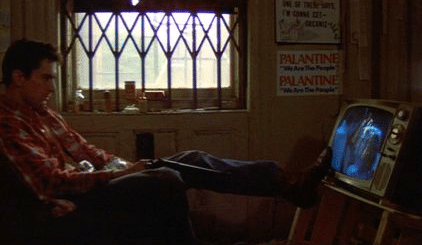
- Travis pushes the TV harder and further. June tells Brock about Phillip.
- Travis rocks the TV with his foot until June says, “I love him.”
- Travis pushes the TV right over. It smashes on the floor.
Hand to forehead. Curled knuckles to temple. Travis rocks a bit. He just can’t get those demons out of his head.
Damn. Goddamn.
He shakes his head.
Goddamn
MORALITY – Obligatory Scene – Hero faces an All Is Lost Moment and either discovers their inner moral code or chooses the immoral path.
Travis has to take his mind off Betsy and Palantine just to alleviate his own suffering. The first kill hasn’t made him feel better. If anything he feels worse.
Reaching this level of pain seems to have made him step out of his madness for a quick glimpse of another possible solution.
WESTERN – Saviour Myth
Travis has this snap revelation wherein he needs to reach out to help someone else with their (perceived) suffering and do some good in the world. And so he decides to pay a visit to Iris with the intent of rescuing the girl prostitute.
WESTERN – Convention – The Hero’s Object of Desire is to Stop the Villain and save the Victim
OUTSIDE STREET – DAY
Travis is in the cab. Parked on a street close to Iris’s place of work.
Iris appears. She walks with the other girl. She crosses in front of his cab. Travis gets out and walks beside her. She looks over:
“You’re looking for some action?”

She points to Matthew (Sport) and tells Travis to talk to him. And that she’ll be waiting for him.


Sport (Harvey Keitel) immediately thinks Travis is a cop. But when he realizes he isn’t, he tells him the deal with Iris including the price and all the things he can do with and to her. This is such a sickening speech that it adequately secures the extremely likeable Sport as the most loathsome and despicable Villain so far. Travis is so chillingly still at times that it unnerves Sport, as he doesn’t know how to take him.
Inside a very dark, dimly lit building Iris leads Travis down a hall of graffiti. A guy inside demands 10 bucks. Travis gives him the money. Travis follows Iris to a room but takes his time creaking the door open after her, almost afraid to come in. Iris tells him, “Come on!”
Are you really 12 and a ½?
She is lighting a cigarette.
“Listen Mr. It’s your time; 15 minutes ain’t long. When that cigarette burns out your time is up.”
Iris starts to get undressed, but Travis wants to know all about her. This is only the second time in the movie that Travis has actually shown interest in another person, enough to ask her questions. The first was Betsy, but that came across like an interrogation. Here we see Travis’s compassion and horror at Iris’s taken innocence.
How old are you? You won’t tell me? What’s your name?
“Easy.”
That’s not any kind a name.
“It’s easy to remember.”
Yeah, but what’s your real name.
“I don’t like my real name.”
What’s your real name.
Iris.
“Well what’s wrong with that? That’s a nice name.
Ha, that’s what you think.
She starts to take off her blouse.
No, no. Don’t do that. Don’t do that. Don’t you remember me?
After explaining that it was his taxi she got into and her not remembering, Travis says:
It’s all right; I’m gonna get you out of here.
“Listen Mr. We better make it or Sport’ll get mad.
After she tries to undo his pants many times, he takes her under the armpits and throws her back onto the couch. He walks away:
Goddammit! Shit man! What’s the hell is the matter with you?
He tries to explain that he is here to help her escape but as far as she’s concerned:
I can leave anytime I want to.
Travis tries to understand her lack of desire to escape. She says:
Look, I understand and it means something really.
Can I see you again?
They agree to meet for breakfast tomorrow – at 1pm. She shakes his hand. He touches her cheek.
Sweet Iris.
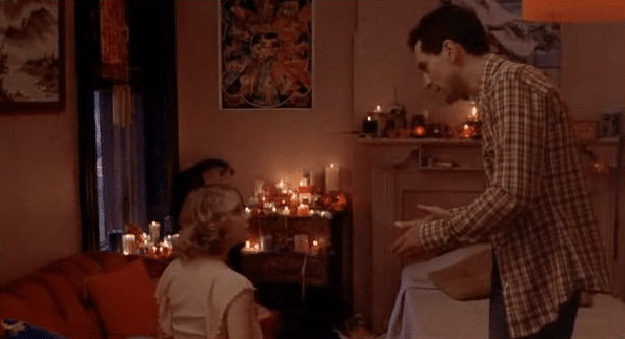
He leaves.
Travis gives the guy outside the $20 that Sport threw into his cab.
NEXT DAY – BREAKFAST:
Iris looks like a normal kid. And Travis tries to convert her to the idea of going home.
You should be going to school. You know, that kind of stuff.
She tells him he’s square and he gives her an impassioned lecture.
You’re full of shit, man.
She puts sugar and jam on her toast while he continues.
…walking out with those fucking creeps. You’re the one who’s square, man. I don’t screw and fuck with a bunch of killers and junkies the way you do. You call that being hip? What world you from?
She puts her toast down.
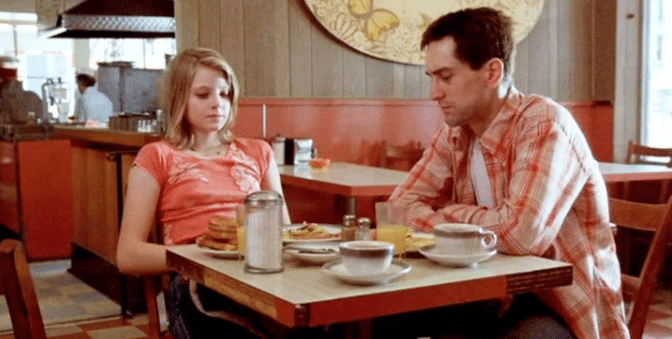
“Who’s a killer?”
That guy Sport’s a killer; that’s who is a killer.
An interesting point that has no factual evidence to it. But Travis projects his own sins onto others. He just killed someone.
Sport never killed no one; he’s a Libra. I’m a Libra too. That’s why we get along so well.
… He’s also a dope shooter.
So, what makes you so high and mighty. Will you tell me that? Didn’t you ever try looking at your own eyeballs in the mirror?
It’s clear that Iris doesn’t want to leave Sport.
==
This line of Iris’s is eerily similar to one that Jodie Foster will say to Hannibal Lecter many years later:
Clarice Starling: You see a lot, Doctor. But are you strong enough to point that high-powered perception at yourself?
Scorsese describes Travis as being like a “religious zealot. They’ll convert you even if it kills you.”
—
BREAKFAST CONT’D
WESTERN – Convention – Speech in praise of the Villain (even though it is short)
Iris explains that Sport never treats her badly, that
He never beat me, not even once.
But you can’t allow him to do the same to other girls. You can’t allow him to do that. He’s the lowest kind of person in the world. Somebody’s got to do something to him. He’s the scum of the earth. He’s the worst sucking scum I have ever seen. You know what he told me about you? He’s calling you names. He called you a little piece of chicken.
He doesn’t mean that.
The conversation continues until Iris says that she might move to a commune. She tells him he should go with her and he says he can’t; he has something important to do:
Something for the government. The cab thing is just part time.
Are you a narc.?
Do I look like a narc?
Yeah.
I am a narc!
They laugh.
I’m gonna give you the money to go to the commune.
Oh, no. You don’t have to do that.
But he doesn’t want her to take anything from them.
I might be going away for a while.
She takes her glasses off.
STATUS – point of no return. Hero knows that they can never go back to the way things used to be. I think Travis knows here that he will likely be dead soon. And Iris feels the gravity of his statement too.
WESTERN – Convention – The Power Divide between the Hero and the Villain is very large. The Villain is far more powerful than the Hero. Sport gives Iris what she needs: comfort, a feeling of safety, and a feeling of being loved. He gives her things that were missing from her family. He has a hold on her that Travis can’t break – even to save her.
BACK IN IRIS’S ROOM
Iris is with Sport.
I don’t like what I’m doing Sport.
Baby I never wanted you to like what you’re doing. If you ever liked what you’re doing, you wouldn’t be my woman.
Classic predator speech from a pimp. Especially referring to a girl as a woman.
You never spend any time with me anymore.
I’ve got to attend to business, baby. You miss your man, don’t you? I don’t like to be away from you either. Do you know how I feel about you? I depend on you. I’d be lost without you.
He puts a record on the player. He draws her into a slow dance and tells her everything she wants to hear, which is both beautiful and very disturbing. Beautiful, because Iris melts into him and feels secure and loved – if only for this moment.

GUN RANGE – MORE TRAINING
- Travis shoots a gun repeatedly at a target; he’s a good shot
ANOTHER MONTAGE:
RITUALISTIC PREPARATION
- Travis polishes his boots meticulously.
- He burns the dead flowers that were returned by Betsy.
- He sharpens his knife then cuts the right sleeve off his white shirt. He puts the white shirt on.
- He secures the knife onto his boot with tape.
- He puts 5 x $100.00 bills on top of a note that reads:
(VO): Dear Iris, This should be enough money for your trip. By the time you read this I will be dead. Travis.
He wraps the money into the note.
Now I see it clearly; my whole life is pointed in one direction. I see that now. There never has been any choice for me.
Travis sees his attempt to rescue Iris as having an almost religious significance, like he is her saviour, a chosen one on a mission from God.
His ritualistic preparation almost seems to absolve him of the gruesome and public assassination he is about to perform on Palantine, which he seems to believe he has been called to do.
PALANTINE RALLY OUTDOORS – DAY
The Secret Service guys are helping Palantine get through the crowd. Everyone’s yelling and clapping. Palatine gets up onto the platform and moves towards the mic.
Tom opens Palantine’s speech by introducing him to the crowd:
“Ladies and gentlemen. The next President of the United States: Senator Charles Palantine.”
Everyone claps. Palantine takes the mic. We hear his speech in (VO) as Travis climbs out of his cab. He stands alone on the outskirts of the crowd.
Schrader: Travis looks like the most suspicious human being alive. Anyone scanning the crowd would immediately light upon Travis and think, “There is an assassin.”

Palantine is reaching the end of his speech.
Back to Travis; he’s got a weird smile on his face. He folds his arms and then claps with the rest of them. The Secret Service guy that he talked to is scanning the crowd. Travis claps very loudly again and two SS guys give each other the eye back at the stand.
- Palantine and crew file off stage slowly and Travis walks into the centre of the crowd towards the Senator.
- Secret Service guys look concerned as they lead Palatine out of the crowd
- Travis smiles as he walks towards Palantine.
- He undoes his jacket.
- The Secret Service guy recognizes him and says to another, “Get that man!”
- Travis sees this and he runs out of the crowd
- Another Secret Service guy runs after him, but bumps into some people and falls over.
TRAVIS’S APARTMENT
Travis is shaken. He’s takes more pills, washes them down with old beer. He needs what he needs and he’s not going to fail…
WESTERN – Convention – The Hero’s object of desire is to stop the villain and save the victim.
IRIS’S PLACE OF WORK – NIGHT
Here the Villain is Sport and crew. The victim is Iris, but Travis is stepping up to be the hero. He’s here to prove himself. He does care about Iris genuinely, but this is unplanned, reckless, and impulsive; it is all about him when it gets down to it. Besides, he just sent money to help Iris get out of here. At this point Travis has already committed to the kill. He is psyched. At least in killing Sport he will be cleaning some trash off the sidewalk.
He can convince himself that this will accomplish a few things:
- He will wash the streets “clean” of some scum.
- He will save Iris and in his fantasy she will go home and live happily ever after
- he will die a hero and his self sacrifice will not have been in vain
- He will be put out of his own endless misery and never have another lonely day.
OUTSIDE IRIS’S PLACE OF WORK
A mob guy walks up to Sport. They shake hands. He asks:
Got the money?
Sure. Okay
Is Iris in her room?
Yeah
Sport gives the guy money and the guy goes to visit Iris.
WESTERN – OBLIGATORY SCENE – THE SHOWDOWN / GUNFIGHT– Where the Hero and Villain face off: The Central event of the Western Story and what the reader is waiting for. It is the moment when the Hero’s gift is expressed.
Travis drives to Iris’s place of work. He gets out of the cab and walks over to Sport, who is still on guard in the shadows of the door.
Hey Sport how are you doing?
OK, OK, my man. How…Where do I know you from, man?
I don’t know. How’s everything in the Pimp business?
Do I know you?
No. Do I know you?
Get outta here. C’mon get lost.
Do I know you?
How’s Iris?
You know Iris?
No. I don’t know nobody named Iris. Come on. Get outta here, man.
You don’t know nobody named Iris?
I don’t know nobody named Iris.
No?
Hey! Get back to your fucking tribe before you get hurt. Do me a favour. I don’t want no trouble, OK
You gotta gun?
Flicking his lit cigarette at Travis
Get outta here, man
Kicking at Travis’s leg
Get outta here.
Travis pulls out a gun and puts it to Sport’s stomach.
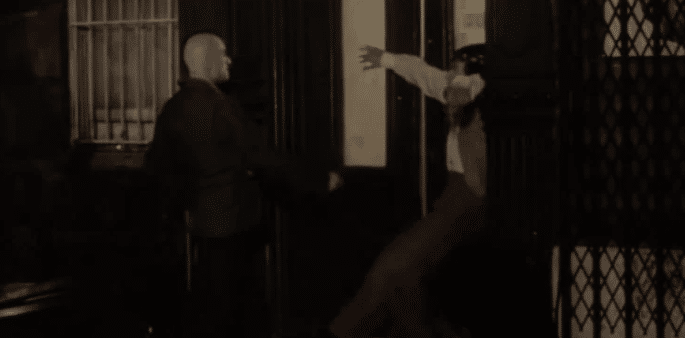
Suck on this!
He fires. Sport falls back and clings to some doors that he falls into
Travis walks away and towards the building where Iris works. He walks in and encounters the guy who takes the money… Travis shoots off the guy’s fingers.

IRIS’S ROOM
She hears the shot and turns her head quickly.
HALLWAY
A shot hits Travis in the neck. It is Sport, who shoots again and misses, but Travis is a great shot – it’s part of his gift. He shoots Sport again. Flying back, Sport breaks the glass behind him.
Travis puts his gun down for a moment and holds his neck to stop the blood from pouring out.
More shots fire out. The $ guy yells and tries to hold onto Travis’s legs as he climbs the stairs:
I’ll kill ya. I’ll kill ya
IRIS’S ROOM
She is frightened. The mob guy leaves the room and shoots Travis in the arm. He drops his gun, but the contraption he created with the drawer slider shoots out of his sleeve putting the hidden gun into Travis’s hand. Travis uses this to fire many shots at the mob guy, who falls back into Iris’s room – dead. She screams.
HALLWAY
$ guy is coming up behind.
You crazy son of a bitch. I’ll kill you
$ man grabs Travis from behind as he forces him into Iris’s room. They fall to the floor in a wrestle. Travis grabs his boot knife and sticks it through the guy’s hand.
Travis picks up $ guy’s guns and as Iris screams:

- Travis kills the guy
- Iris moves away, traumatized, and cries without looking at Travis.
- Travis tries to kill himself with two different guns, but both are empty.
- Travis struggles to get onto the couch.
- His movements are choppy and horrific like a monster.
- The police arrive
- Travis lies back and looks like he is dead. He indicates to the cop to shoot him.
There is an aerial shot of the macabre scene that floats back slowly overtop of the mayhem, the bodies, the guns.
OUTSIDE
A crowd of people gather, while Cop cars arrive and medics run towards the building.
THRILLER – Obligatory Scene – False Ending (there must be two endings).
The first ending was when Travis seemed to have died in the shootout.
The second ending shows us that Travis survived the shootings, has been in a coma, and has been declared a hero for what has been interpreted as vigilante justice. Or “True Justice,” as Shawn would call it, which has nothing to do with the law. (perfect for a Western).
WESTERN – Obligatory Scene – The Hero’s sacrifice is Rewarded
TRAVIS’S APARTMENT
We float across the wall and see newspaper clippings: TAXI DRIVER BATTLES GANGSTERS… There is also a letter from Iris’s parents, on the same wall, thanking him for returning Iris back to them.
Travis has been declared a hero by the press, Iris’s parents, and his fellow cabbies.
He becomes an accidental Hero.
Schrader: He was lucky this time. He shot the right guys.
OUTSIDE COFFEE SHOP
We are outside the coffee shop where the taxi drivers meet. Wizard tells another magnificent tale. Travis says hi. Wizard tells Travis he has a fare. Travis looks over; someone is in the back of his cab.
LOVE STORY – Obligatory Scene – Lovers Reunite
It’s Betsy.
Travis’s reactions to her are cool, but polite. His suspicious eyes appear once again in the rear-view mirror. And he doesn’t make it easy for her to make any attempt to do whatever it is she came to do.

INSIDE TRAVIS’S CAB
Travis is driving; he looks suspiciously at Betsy who sits in the back, mistrustful, wondering what’s going on. He keeps looking in the rear-view mirror.
Hello Travis
It’s Betsy’s voice.
Hello
He smiles. She looks stunning. She looks a bit uncertain
I hear Palantine got the nomination.
Yeah won’t be long now. 17 days
I hope he wins.
I read about you in the papers. How are you?
It was nothing, really. I’ve got over that. Papers always blow these things up.
He drives her to her place. Which suggests that she trusts him now, but he doesn’t encourage anything. She gets out. He barely pays any attention to her.
She asks:
How much was it?
He resets the meter and looks at her:
So long
He drives off.
==
Travis now has what he NEEDS: validation and respect. He’s a Hero! He appears to be the “principled protagonist who rises without compromise.” (Status Admiration), which gives him even more STATUS.
Because he has what he needs, he no longer feels lonely, so he doesn’t need Betsy anymore.
STATUS – convention – Ironic Win-but Lose ending
Travis wins his status – Hero – but loses the possibility of Love because he either puts his ego first, knowing that if he gave her a chance he might have to give up some of his hard-won validation. He’d have to come down a bit and be human.
or
He thinks she’s a sellout and his moral fibre is such that if he wasn’t good enough for her then, then he’s not going to go out with her now. But it’s hard to know with Travis.
==
INSIDE TRAVIS’S CAB CONT’D
He looks at her briefly in his rear-view mirror, as she walks towards her building. But then Travis does a double take at something; he looks really disturbed this time.
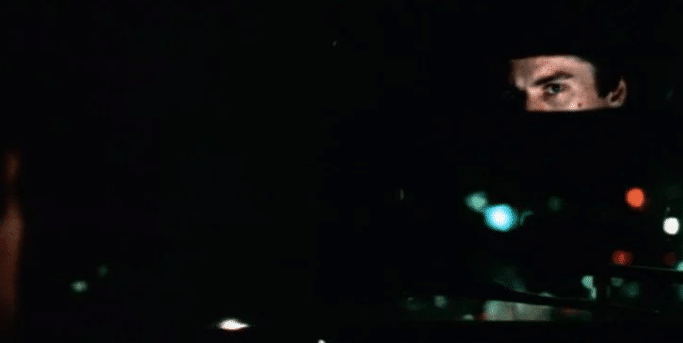
He hasn’t changed. He’s in a loop. He’ll start right back at the beginning again.
Schrader: a year after this movie, this guy is no longer alive.
WESTERN CONTROLLING IDEA: Positive: Success results when a person is true to their values whether or not it leads to social betterment.
For Travis he has achieved success. He is a “Hero,” despite himself. He took “scum” off the streets as he wanted from the very beginning and many people respect that – especially when the police won’t/ can’t do anything to help; he was true to his values. And he fully accepts that boost to his self esteem, the esteem of others (3rd party validation), and Betsy’s attention even though he turns her down.
On the value scale, Travis moved from subjugation to freedom and autonomy and he got rewarded for it.
CONTROLLING IDEA OF WESTERN:
Positive: Justice prevails when the uncompromising individual sacrifices himself or herself for the good of all.
Again, this is the twist that has fallen onto the real narrative. It’s what the people around him see.
Justice in this case is TRUE JUSTICE – the kind that doesn’t have anything to do with law. Some would agree that Sport and his friends deserve to die for what they do to girls like Iris. Schrader says Travis should face the death penalty for it.
I would say that on the Morality Spectrum of Values, killing Sport and his thugs is Selfishness masked as Altruism. And because Travis has been so deranged he might have convinced himself that he performed at the other end of the scale. He believes in his own press, even if they are wrong.
SPECTRUM OF VALUES FOR THE MORALITY GENRE
Other value shifts that Travis went through:
WORLDVIEW: from meaninglessness to meaning
STATUS: from failure to success
LOVE: From Smitten to Indifference
A NOTE ABOUT THE ENDING.
Many viewers will interpret the second ending as Travis’s dying dream or something like that. Possibly because it seems surreal. How can he be this mohawk-wearing, gunfighting madman one minute and then be civilized, pleasant, and with no mental or physical repercussions of the wild west that he recently created?
This is what I thought when I first saw the film, but Scorsese, Schrader, and DeNiro disagree. They meant for this meeting with Betsy and his recovery to be real.
Of course you can interpret it your own way, but for me to see their point I have to go back to the idea of a psychosis. If Travis went into a coma, his psychosis could have passed naturally plus the medical team may have given him some medication that would also take him out of it. Some psychoses are just a break and don’t go on forever. So in my books, the coma drew him out of the psychosis.
And so we come back to the Question posed by the Western Genre: Is the self-reliant individual dangerous to order or necessary to defend the powerless?”
I’d love to hear what you think.
And if you’d like some help with your manuscript (novel or film/TV), check out my website and book a free 30 minute call so we can figure out how I can help you: www.tanyalovetti.com
References:
All of the definitions for Genres and their Obligatory Scenes and Conventions came from Story Grid literature and from @rachelle_ramirez’s series of work on the Secrets of the Content Genres
@jblair https://storygrid.com/the-all-is-lost-moment-2/
All of the Spectrums of Value were created by @annehawley55
The Four Core Framework by Shawn Coyne
Bullies, Bastards and Bitches by Jessica Page Morrell
Ground Your Craft Course: SG
Numerous interviews with Scorsese and Schrader, most notably: https://www.youtube.com/watch?v=l65AZvj_jbE&t=5065s
The girl on train podcast: https://storygrid.com/editor-roundtable-girl-on-the-train/
Myth and The Movies, Stuart Voytilla
Judith Cummings of The New York Times: https://www.nytimes.com/1976/12/01/archives/police-leaflets-urging-prostitutes-leave-pimps-and-get-out-of-game.html
Jeffrey A. Spicer: The Changing Face of the Western: An Analysis of Hollywood Western Films from Director John Ford and Others During the Years 1939 to 1964: https://engagedscholarship.csuohio.edu/cgi/viewcontent.cgi?article=1580&context=etdarchive
Karl Marlantes – former US Marine in Vietnam.
Kendra Cherry of verywellmind.com
https://digital.lib.washington.edu/researchworks/bitstream/handle/
1773/22045/Fredericks_washington_0250E_10824.pdf?sequence=1
Troubling Others and Tormenting Ourselves: The Nature and Moral Significance of Jealousy, Rachel Fredericks:
Myth and The Movies, Stuart Voytilla